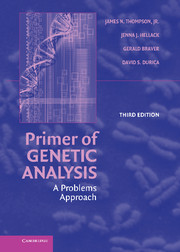Book contents
- Frontmatter
- Contents
- Preface
- Note on Genetic Symbols
- 1 Overview of Genetic Organization and Scale
- 2 Mitosis and Meiosis
- 3 Nucleic Acids: DNA and RNA
- 4 Basic Mendelian Genetics
- 5 Probability and Chi-Square
- 6 Sex-Linkage and Gene Interactions
- 7 Pedigree Analysis
- 8 Overview of Basic Statistical Testing
- 9 Quantitative Inheritance
- 10 Overview of Genetic Mapping
- 11 Assessing Chromosome Linkage Relationships
- 12 Linkage and Mapping in Diploids
- 13 Mapping in Bacteria and Viruses
- 14 Overview of Types of Genetic Change
- 15 Gene Mutation
- 16 Changes in Chromosome Number and Structure
- 17 Protein Synthesis and the Genetic Code
- 18 Gene Regulation and Development
- 19 Overview of Molecular Biology Techniques
- 20 DNA Mapping and Human Genome Analysis
- 21 Basic Population Genetics
- 22 Selection and Evolution
- 23 Practice Tests
- 24 Answers to Practice Tests and Crossword Puzzles
- 25 Landmarks in the History of Genetics
- Glossary
- Reference Tables
5 - Probability and Chi-Square
Published online by Cambridge University Press: 05 June 2012
- Frontmatter
- Contents
- Preface
- Note on Genetic Symbols
- 1 Overview of Genetic Organization and Scale
- 2 Mitosis and Meiosis
- 3 Nucleic Acids: DNA and RNA
- 4 Basic Mendelian Genetics
- 5 Probability and Chi-Square
- 6 Sex-Linkage and Gene Interactions
- 7 Pedigree Analysis
- 8 Overview of Basic Statistical Testing
- 9 Quantitative Inheritance
- 10 Overview of Genetic Mapping
- 11 Assessing Chromosome Linkage Relationships
- 12 Linkage and Mapping in Diploids
- 13 Mapping in Bacteria and Viruses
- 14 Overview of Types of Genetic Change
- 15 Gene Mutation
- 16 Changes in Chromosome Number and Structure
- 17 Protein Synthesis and the Genetic Code
- 18 Gene Regulation and Development
- 19 Overview of Molecular Biology Techniques
- 20 DNA Mapping and Human Genome Analysis
- 21 Basic Population Genetics
- 22 Selection and Evolution
- 23 Practice Tests
- 24 Answers to Practice Tests and Crossword Puzzles
- 25 Landmarks in the History of Genetics
- Glossary
- Reference Tables
Summary
STUDY HINTS
The ability to determine the probability of an event or series of events is fundamental to many applications of genetic principles. Thinking in terms of probability is not easy at first, but with a set of guidelines and some practice, you should find that you soon have no difficulty. In the following section we will discuss some important terms and then summarize the general types of probability problems you might expect to encounter in genetics.
First, let us contrast two important phrases. Independent events are events that have no causal interrelationship. The conception of the first child in a family, for example, cannot biologically influence the fusion of sperm and egg at fertilization for a second child. Each fertilization is an independent event, and each probability for segregation or sex determination must be assessed independently. Mutually exclusive events, on the other hand, are related in that the occurrence of one eliminates the possibility that the other will occur. A normal child cannot be both a boy child and a girl child. Sex determination yields either of two mutually exclusive events.
Both of these ideas play a role in solving a probability problem in genetics. Depending upon the genotype of the parents, the probabilities of mutually exclusive events, for example, the birth of “normal” progeny as opposed to the birth of “affected” progeny, may be different.
- Type
- Chapter
- Information
- Primer of Genetic AnalysisA Problems Approach, pp. 42 - 54Publisher: Cambridge University PressPrint publication year: 2007



